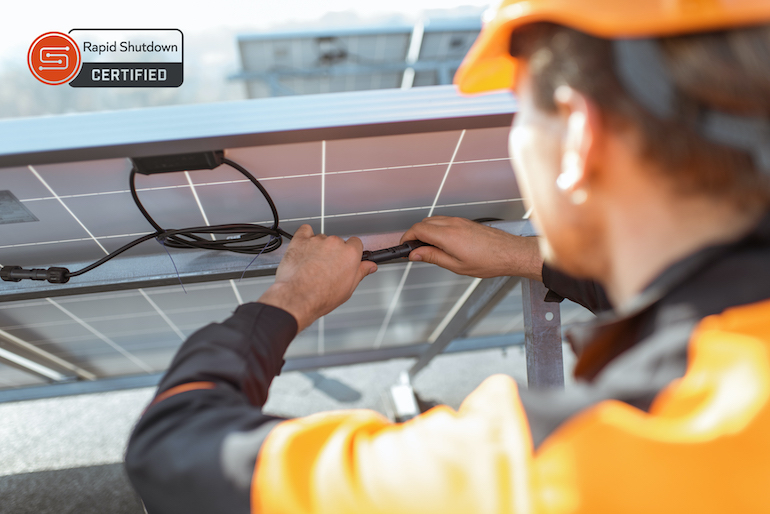5 benefits to standardized solutions for rapid shutdown
|
By Tom Tansy, chairman of the SunSpec Alliance
 Rapid shutdown compliance has become a bit of a pain point for professionals in the solar industry, but there is good reason for this rule when it comes to first responder safety and working around a solar array. While safety is the essential and most important purpose, rapid shutdown also has a host of other benefits.
Rapid shutdown compliance has become a bit of a pain point for professionals in the solar industry, but there is good reason for this rule when it comes to first responder safety and working around a solar array. While safety is the essential and most important purpose, rapid shutdown also has a host of other benefits.
With 34 states now requiring rapid shutdown for PV arrays, compliance is necessary. But it doesn’t have to be painful. A growing number of manufacturers and balance-of-system suppliers have recognized that producing solutions that can operate using the same open communication standard and specifications, which the SunSpec Alliance has developed, can make it much easier for industry professionals to design projects and install systems that function well for the life of the system.
There are a multitude of benefits when using a standardized solution that is SunSpec-certified for rapid shutdown, from risk mitigation to compatibility to cost. Here is a closer look at five of the key benefits for solar installers.
Freedom of choice
SunSpec rapid shutdown-certified solutions offer more choice to installers. Ideally, as more solutions are certified, installers will have a wide selection of products and solutions from multiple suppliers that can be combined and work across a common communication standard.
This means an installer won’t be locked into one brand or platform, or have to rely on a single supplier with a non-standardized solution, but will instead have several component choices that can work across systems while meeting their individual needs or preferences when it comes to other features like size, color or cost.
Cost reduction
The adoption of standardized products will help stabilize the market and reduce the risk associated with relying on one supplier. This makes it more cost-effective to use standardized solutions for rapid shutdown. With standardized components, the cost for each item goes down, so the final assembly of a system will have a lower overall build cost.
This savings could be passed on to the consumer, or it can be recuperated as profit for the installer. Either way, it’s a winning strategy.
Checks system health
When using a product certified with SunSpec’s rapid shutdown technology, the signaling system acts as a health check. Every time the system is commissioned (which essentially happens every time the sun comes up), if every panel turns on and transmits a signal, a customer will know their system is working. If something doesn’t work in a panel or inverter, it will be apparent right away as long as the customer has gained some understanding of their system and how it operates.
This makes it easier for a customer to know when to call a service provider for a repair, whereas a system that doesn’t operate with standardized solutions could take months to indicate any problems.
Compatibility of components and seamless integration
In today’s industry, amid COVID-19 and trade tensions, no supplier is really safe from disruption to their business. But imagine you design a system based on one brand or a single supplier, and the product malfunctions or fails. What if that supplier has gone out of business or halted manufacturing five years from now?
Instead, when installers use a product that is SunSpec-certified for rapid shutdown, it would be much easier to find a compatible product to replace it with, whether or not the original supplier is operating. The installer can pick any component and place it in the array, and the system will continue to operate with no disruption as opposed to working with an out-of-stock product, which would require an entire redesign.
This means long-term system health, knowing components can be easily updated or replaced and still be interoperable.
Simpler compliance and satisfied customers
With more standardized solutions for rapid shutdown coming onto the market, installers have additional options that they know will be compliant with rapid shutdown requirements. An installer does not have to wait for a product to be available from a certain supplier, and the system build won’t be held up because of a missing component. In turn, customers will be more satisfied as they are less likely to experience delays in their systems being commissioned.
The SunSpec Alliance is committed to applying standards to the distributed energy industry, which will ultimately help transform the solar PV marketplace and create an environment that makes it easier and more cost-effective for solar professionals to do business.
